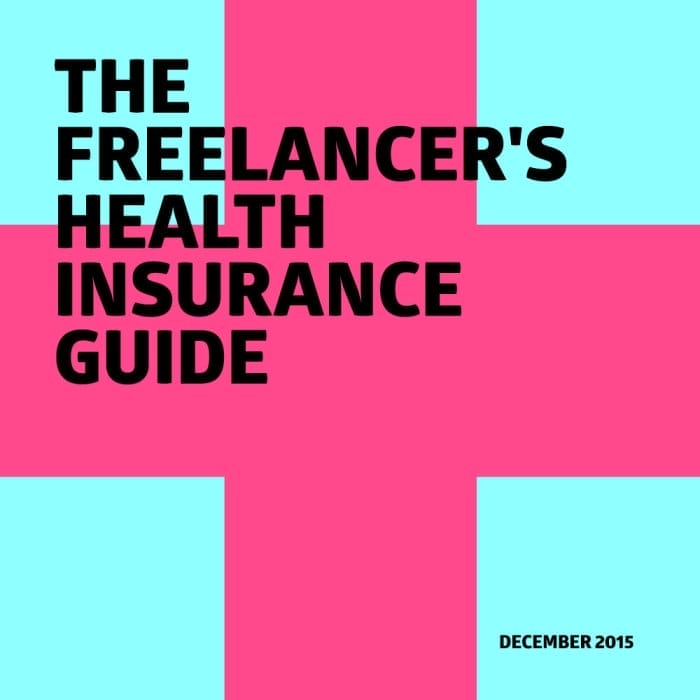As a freelancer, securing health insurance can be a daunting task. With the responsibility of choosing the right plan that fits your unique needs and budget, it’s essential to navigate the complexities of health insurance options. This guide provides comprehensive tips and insights to empower freelancers in making informed decisions about their health insurance coverage.
Understanding the various health insurance plans available, evaluating coverage options, and considering specific healthcare needs are crucial steps in selecting the most suitable plan. Additionally, budgeting for premiums, exploring cost-saving strategies, and staying informed about changes in regulations and policies are key factors to consider.
Understanding Health Insurance Options for Freelancers

Intro paragraphAs a freelancer, navigating the world of health insurance can be daunting. With a variety of plans available, it’s essential to understand the differences and make an informed decision that suits your needs and budget. This guide will provide an overview of the various health insurance options available to freelancers, including individual health insurance plans, group health insurance plans, and short-term health insurance plans.
Individual Health Insurance Plans
Individual health insurance plans are designed for individuals who do not have access to employer-sponsored group health insurance. These plans are purchased directly from an insurance company and provide coverage for a variety of medical expenses, including doctor visits, hospital stays, and prescription drugs.
Premiums for individual health insurance plans vary depending on factors such as age, location, and the level of coverage selected.
Group Health Insurance Plans
Group health insurance plans are offered by employers to their employees. These plans typically provide more comprehensive coverage than individual health insurance plans and often have lower premiums due to the larger pool of insured individuals. Freelancers may be able to access group health insurance plans through professional associations or trade organizations that offer group health insurance to their members.
Short-Term Health Insurance Plans
Short-term health insurance plans are temporary health insurance policies that provide coverage for a limited period of time, typically less than 12 months. These plans are often used by freelancers who are between jobs or who are waiting for their employer-sponsored health insurance to start.
Short-term health insurance plans typically have lower premiums than individual health insurance plans, but they also provide less comprehensive coverage.
Evaluating Health Insurance Plans

Freelancers need to carefully assess and compare different health insurance plans to find the one that best meets their needs and budget. Key factors to consider include coverage, premiums, deductibles, copays, and coinsurance.
Coverage
Coverage refers to the types of medical expenses that the plan covers. Freelancers should consider their current and future health needs, including regular checkups, prescription drugs, hospitalization, and specialist care. They should also consider whether the plan covers preventive care, such as vaccines and screenings.
Premiums
Premiums are the monthly payments that freelancers make to their health insurance company. Premiums can vary significantly from plan to plan, so it’s important to compare costs before making a decision. Freelancers should also consider whether they can afford the premium if their income fluctuates.
Deductibles
A deductible is the amount that freelancers must pay out of pocket before their health insurance plan starts to cover expenses. Deductibles can vary from plan to plan, and they can be a significant financial burden. Freelancers should choose a plan with a deductible that they can afford to pay.
Copays and Coinsurance
Copays are fixed amounts that freelancers pay for certain medical services, such as doctor’s visits and prescription drugs. Coinsurance is a percentage of the cost of medical services that freelancers must pay after they have met their deductible. Freelancers should consider the copays and coinsurance amounts when choosing a health insurance plan.
Considering Freelancers’ Unique Needs

Freelancers have specific healthcare needs and concerns that differ from those of traditional employees. These needs must be addressed when selecting health insurance.
Understanding Freelancers’ Healthcare Needs
Freelancers often face irregular income, making it challenging to budget for healthcare expenses. They may also have gaps in coverage due to changes in work status. Additionally, freelancers may have unique healthcare needs, such as coverage for pre-existing conditions, mental health coverage, and telehealth options.
Addressing Freelancers’ Unique Healthcare Needs
To address these unique needs, freelancers should consider the following tips:
- Assess Your Healthcare Needs: Understand your current and future healthcare needs. Consider factors such as age, health status, family history, and lifestyle.
- Compare Health Insurance Plans: Research and compare different health insurance plans to find one that meets your specific needs and budget.
- Consider a High-Deductible Health Plan (HDHP) with a Health Savings Account (HSA): An HDHP can help you save money on monthly premiums, while an HSA allows you to set aside pre-tax dollars to cover eligible healthcare expenses.
- Look for Plans with Pre-existing Condition Coverage: If you have a pre-existing condition, ensure the health insurance plan you choose covers it.
- Choose a Plan with Mental Health Coverage: Mental health is just as important as physical health. Look for a plan that provides comprehensive mental health coverage.
- Consider Telehealth Options: Telehealth services can provide convenient and affordable access to healthcare, especially for freelancers who work remotely or have limited access to traditional healthcare providers.
Budgeting for Health Insurance

Freelancers often face unique challenges when it comes to budgeting for health insurance. Without employer-sponsored plans, they must navigate the complexities of the individual market and find ways to make health insurance affordable. Here are strategies and tips to help freelancers manage their health insurance expenses:
Assessing Financial Situation
Begin by assessing your financial situation. Determine how much you can realistically allocate toward health insurance premiums each month. Consider your income, debts, living expenses, and other financial obligations. This assessment will help you narrow down your options and make informed decisions.
Shopping Around for Plans
Comparison shopping is crucial for finding the best health insurance plan. Compare premiums, deductibles, co-pays, and out-of-pocket maximums from different providers. Use online comparison tools or consult with an insurance broker to get quotes and understand the coverage details. Consider plans that offer a network of providers in your area and cover your essential healthcare needs.
Utilizing Tax Deductions
Freelancers can deduct health insurance premiums from their self-employment income. This deduction can significantly reduce your tax liability. Make sure to keep detailed records of your health insurance payments and consult with a tax advisor to ensure you’re claiming the deduction correctly.
Exploring Alternative Healthcare Options
In addition to traditional health insurance plans, freelancers may consider alternative healthcare options to save money. These options include:
- Health Savings Accounts (HSAs): HSAs allow you to save money tax-free for qualified medical expenses. You can use HSA funds to pay for deductibles, co-pays, and other healthcare costs.
- Health Sharing Ministries (HSMs): HSMs are faith-based organizations that provide healthcare coverage to members. HSMs typically have lower premiums than traditional health insurance plans, but they may also have more restrictive coverage limits.
- Catastrophic Health Insurance: Catastrophic health insurance plans have low premiums but high deductibles. These plans are designed to cover major medical expenses, such as hospitalization or surgery.
Navigating the Health Insurance Marketplace

The Health Insurance Marketplace, also known as the Affordable Care Act (ACA) Marketplace, is a platform established to provide individuals and families with access to affordable health insurance plans. Freelancers can utilize this marketplace to compare and select health insurance plans that suit their needs and budget.
To navigate the Health Insurance Marketplace, freelancers should follow these steps:
Research and Compare Plans
- Visit the official Health Insurance Marketplace website.
- Create an account and provide personal information.
- Enter information about household income and family size.
- Browse available health insurance plans and compare premiums, deductibles, and coverage options.
- Use filters to narrow down the search based on specific needs, such as preferred providers or prescription drug coverage.
Estimate Eligibility for Subsidies
- The Marketplace provides premium tax credits and cost-sharing reductions to eligible individuals and families.
- Freelancers can estimate their eligibility for these subsidies by providing information about their income and household size.
- The Marketplace will display the estimated amount of subsidies they may qualify for.
Enroll in a Health Insurance Plan
- Once a freelancer has selected a health insurance plan, they can enroll directly through the Marketplace website.
- The Marketplace will guide them through the enrollment process and provide instructions on how to make premium payments.
- Freelancers can also enroll in a health insurance plan through a licensed insurance agent or broker.
Understanding Health Insurance Terms

Health insurance can be complex, and understanding the terminology is essential for making informed decisions. Here’s a glossary of common health insurance terms to help you navigate your health coverage:
Deductible
A deductible is the amount you must pay out-of-pocket before your health insurance starts covering your medical expenses. Deductibles can vary widely, and the higher the deductible, the lower your monthly premiums will be.
Copay
A copay is a fixed amount you pay for certain healthcare services, such as doctor’s visits or prescription drugs. Copays are typically lower than the full cost of the service, and they may vary depending on the type of service and your insurance plan.
Coinsurance
Coinsurance is a percentage of the cost of a healthcare service that you pay after you’ve met your deductible. For example, if you have an 80/20 coinsurance, you’ll pay 20% of the cost of the service after you’ve met your deductible.
Out-of-Pocket Maximum
An out-of-pocket maximum is the most you’ll have to pay for covered healthcare expenses in a year. Once you’ve reached your out-of-pocket maximum, your insurance will cover 100% of your covered expenses.
Managing Health Insurance Claims
As a freelancer, navigating health insurance claims can be challenging. Here’s a comprehensive guide to help you file claims effectively, maximize benefits, and minimize out-of-pocket costs.
Understanding the claims process is crucial. Keep detailed records of medical expenses, including receipts, bills, and Explanation of Benefits (EOB) statements. These documents will be essential when filing claims.
Filing Health Insurance Claims
- Review Your Policy: Familiarize yourself with your health insurance policy’s terms, conditions, and coverage limits. This knowledge will guide you through the claims process.
- Gather Necessary Documentation: Compile all relevant medical records, bills, receipts, and EOB statements related to the claim. Ensure the information is accurate and complete.
- Complete Claim Forms: Obtain the appropriate claim forms from your insurance provider or download them online. Fill out the forms accurately and provide all required information.
- Submit the Claim: Submit the completed claim forms and supporting documentation to your insurance provider. Follow the instructions provided by your insurer regarding the submission method.
Maximizing Benefits and Minimizing Costs
- Utilize In-Network Providers: Opting for in-network providers can significantly reduce your out-of-pocket expenses. In-network providers have negotiated rates with your insurance company, leading to lower costs.
- Understand Coinsurance and Deductibles: Familiarize yourself with your policy’s coinsurance and deductible requirements. Coinsurance is a percentage of the covered expenses you pay after meeting your deductible, while a deductible is the amount you pay before your insurance coverage begins.
- Consider Generic Medications: Generic medications are often more affordable than brand-name drugs. Consult with your healthcare provider to determine if generic alternatives are available for your prescribed medications.
Staying Informed About Health Insurance Changes
Intro paragraphNavigating the complexities of health insurance as a freelancer requires vigilance and adaptability. Staying informed about regulatory shifts and market developments is crucial to ensure coverage remains aligned with evolving needs and costs. This section delves into the significance of staying up-to-date and provides practical tips for freelancers to monitor health insurance changes effectively.
Monitoring Regulatory Changes
Understanding health insurance regulations is essential for freelancers. Changes in legislation or government policies can impact coverage options, eligibility criteria, and financial obligations. Monitoring these changes ensures freelancers are aware of their rights and responsibilities, allowing them to make informed decisions about their health insurance.
Tracking Market Trends
Staying abreast of market trends is equally important. Fluctuations in premiums, the emergence of new health insurance plans, and shifts in provider networks can influence coverage options and costs. By keeping track of market trends, freelancers can evaluate if their current plan remains competitive and explore alternatives that better align with their evolving needs and budget.
Leveraging Online Resources
The internet offers a wealth of resources for freelancers to stay informed about health insurance changes. Government websites, industry publications, and online forums provide up-to-date information on regulatory changes, market trends, and plan comparisons. Subscribing to email newsletters and following social media accounts of reputable sources can ensure timely updates and access to valuable insights.
Consulting Insurance Professionals
Engaging with insurance professionals is another effective way to stay informed. Insurance agents, brokers, and financial advisors can provide personalized guidance based on a freelancer’s unique circumstances. They can explain complex regulations, compare plans, and assist in selecting coverage that aligns with current and future needs.
Maintaining Flexibility
The healthcare landscape is constantly evolving, and freelancers should maintain flexibility in their approach to health insurance. Being open to exploring new options and adapting coverage as circumstances change ensures they remain protected and financially secure.
Additional Resources for Freelancers

As a freelancer, staying informed and making well-informed decisions about health insurance is essential. Fortunately, numerous resources are available to assist you in navigating the complexities of health insurance and selecting a plan that meets your needs.
Government Websites:
- Healthcare.gov: This is the official website of the U.S. government’s health insurance marketplace. Here, you can compare plans, estimate costs, and enroll in a health insurance plan that meets your requirements.
- State Health Insurance Assistance Programs (SHIPs): These programs provide free, unbiased information and counseling to help individuals understand their health insurance options. You can find your state’s SHIP by visiting the National Association of State Health Insurance Assistance Programs (NASHIP) website.
Consumer Advocacy Groups:
- National Consumer Law Center (NCLC): NCLC is a non-profit organization that advocates for consumer rights, including health insurance issues. Their website offers comprehensive information and resources on health insurance, including tips for selecting a plan and resolving disputes with insurance companies.
- Consumers Union: Consumers Union is a non-profit organization that works to advance consumer interests. Their website provides unbiased reviews of health insurance plans, as well as information on health insurance laws and regulations.
Online Forums and Communities:
- Reddit: Reddit has a large community of freelancers who share their experiences and advice on health insurance. You can find subreddits dedicated to health insurance, such as r/HealthInsurance and r/Freelance.
- Freelance Forums: There are numerous online forums and communities specifically for freelancers. These forums often have discussions and threads dedicated to health insurance, where you can connect with other freelancers and learn from their experiences.
Staying Informed:
To make informed decisions about your health insurance, it’s important to stay up-to-date on the latest news and developments in the healthcare industry. Here are some tips:
- Read Industry Publications: There are several publications and websites that cover health insurance news and trends. Some popular options include Kaiser Health News, Health Affairs, and STAT.
- Follow Experts on Social Media: Many health insurance experts and advocates share their insights and opinions on social media platforms. Following them can help you stay informed about important issues and developments.
- Attend Webinars and Workshops: Various organizations and institutions offer webinars and workshops on health insurance. These events can provide valuable information and insights from experts in the field.
Final Conclusion

Selecting the right health insurance plan as a freelancer requires careful consideration and informed decision-making. By understanding the available options, evaluating plans based on coverage and costs, addressing unique healthcare needs, budgeting effectively, and seeking professional advice, freelancers can secure comprehensive coverage that meets their individual requirements and provides peace of mind.
Helpful Answers
What are the key factors to consider when evaluating health insurance plans?
When comparing health insurance plans, consider factors such as coverage for essential healthcare services, premiums, deductibles, copays, coinsurance, and out-of-pocket maximums.
How can freelancers address their unique healthcare needs when selecting a health insurance plan?
Freelancers should consider plans that offer coverage for pre-existing conditions, mental health services, telehealth options, and prescription drug coverage.
What strategies can freelancers employ to budget for health insurance premiums?
Freelancers can explore strategies like shopping around for plans, utilizing tax deductions, and considering alternative healthcare options to manage health insurance costs effectively.
How can freelancers stay informed about changes in health insurance regulations and policies?
Freelancers should regularly check government websites, consumer advocacy groups, and online forums to stay updated on changes that may affect their coverage or costs.
Why is it beneficial for freelancers to consult with a health insurance agent or broker?
Consulting a health insurance professional can provide personalized advice, help freelancers understand complex insurance terms, and assist in finding the most suitable plan based on their specific needs and budget.



